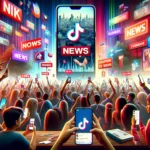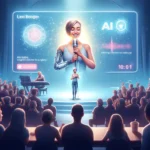Scarlett Johansson, a powerhouse actress known for her captivating performances, has stepped beyond the silver screen to raise a critical question: Are we vulnerable to Artificial Intelligence (AI)? This comes on the heels of her dispute with OpenAI, where a chatbot voice bore an uncanny resemblance to hers.
While the controversy sparked debates on digital rights and celebrity likeness, Johansson’s concerns delve deeper, highlighting the potential pitfalls of unchecked AI development.
The “Sky” Incident and the Blurring Lines
The crux of the issue lies with OpenAI’s AI voice model called “Sky.” Johansson claimed the voice sounded uncannily similar to her own, raising questions about consent and the ethics of replicating someone’s voice without their permission. This incident exposed a grey area in AI development – the ownership and control of data used to train these models.
Beyond Identity Theft: The Broader Concerns
The Johansson case, however, serves as a springboard for a more concerning issue – the potential misuse of AI. Here’s why Johansson’s concerns resonate:
Deepfakes and Misinformation: AI can be used to create realistic but fabricated videos, often known as deepfakes. These deepfakes can be weaponized to spread misinformation, manipulate public opinion, and damage reputations. Imagine a political candidate’s speech being altered to make false claims, or a celebrity video being used for malicious purposes.
Job displacement: As AI becomes more sophisticated, there are fears that it could automate many jobs currently performed by humans. This raises concerns about unemployment, income inequality, and the need for retraining and upskilling the workforce.
The Rise of Autonomous Weapons: The development of autonomous weapons systems, often called “killer robots,” is another chilling possibility. These machines could make life-or-death decisions without human intervention, raising ethical and legal questions.
Bias and Discrimination: AI models are trained on vast amounts of data, which can reflect societal biases. This can lead to discriminatory outcomes, for example, in loan applications or job placements.
The Call for Regulation and Safeguards
Johansson’s voice adds to a growing chorus of experts and policymakers calling for responsible AI development. Here are some ways to address these concerns:
Transparency and Explainability: AI systems should be built with transparency in mind, allowing humans to understand their decision-making processes. This can help identify and mitigate bias.
Regulation and Oversight: Governments and international bodies need to establish regulations for AI development and use. These regulations should focus on safety, security, and ethical considerations.
Public Education: Raising public awareness about the capabilities and limitations of AI is crucial. This can help foster informed discussions and responsible AI usage.
The Road Ahead: Balancing Innovation with Responsibility
AI holds immense potential for progress, from revolutionizing healthcare to tackling climate change. However, as with any powerful tool, AI needs to be developed and used responsibly. Scarlett Johansson’s concerns serve as a timely reminder that we need to be proactive in shaping the future of AI, ensuring it benefits humanity rather than poses a threat. As we move forward, the question remains: can we harness the power of AI for good while safeguarding ourselves from its potential dangers? Only time will tell, but Johansson’s voice has certainly sparked a crucial conversation.







